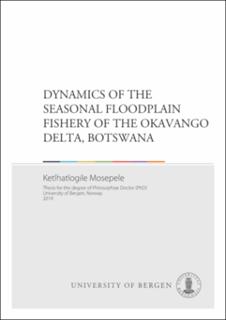| dc.contributor.author | Mosepele, Ketlhatlogile | |
| dc.date.accessioned | 2019-10-03T09:41:46Z | |
| dc.date.available | 2019-10-03T09:41:46Z | |
| dc.date.issued | 2019-08-28 | |
| dc.identifier.uri | http://hdl.handle.net/1956/20907 | |
| dc.description.abstract | Inland fisheries provide vital proteins, jobs and income, for some of the most marginalized communities of the world. The role of inland fisheries in household food security is particularly important in Africa, where most of the world’ poorest are found. Therefore, there is a compelling need to enhance our understanding of the dynamics of floodplain fisheries because of their intrinsic value to riparian communities. Understanding their impotance will lead to their sustainable utilisation, which will contribute to the attainment of some of the 2030 Sustainable Development Goals. Therefore, this thesis examines the relationship between fish dynamics and environmental variability in flood-pulsed systems, by using the Okavango Delta as a case study. Establishing this relationship is important towards identifying the key drivers of change, restoration and persistence in floodplain fish communities. The thesis also highlights the dynamic interactions between seasonal hydrology and nutrient dynamics in floodplain systems. These dynamic processes, coupled with a heterogeneous system, sustain a diverse fish community that is a key source of livelihoods for the delta’s riparian community. Dynamic processes within the fish community, such as distribution, feeding and growth are driven by the seasonal flood pulse. Currently, the Okavango Delta fishery is managed through a series of classical management approaches which are incompatible with the dynamic nature of floodpulsed systems. The best management approach is through balanced harvesting, which has been inadvertently implemented by traditional exploitation practices. Management interventions in floodplain fisheries should be adaptive, practical, realistic and implementable, which in particular means acceptable to the stakeholders. Most developing countries have limited resources, and these should be spent on achievable and practical activities. Informed management also necessitates continuous long-term monitoring of exploited fisheries to follow changes and to gradually improve our understanding fishing patterns and their impact on the fish communities. This involves the collection of fisheries related data across a broad spectrum of activities (e.g. fish consumption, employment creation, various kinds of biological data on species exploited, gear use and efficiencies, etc.) and associated factors/ variables (e.g. environmental factors, various land-use activities, etc.). Once these have been documented and understood, they can be integrated into a flexible management system, which will allow for more adaptive management of these resources. Such integration is currently lacking in the Okavango Delta and also in floodplain fisheries in general. | en_US |
| dc.language.iso | eng | eng |
| dc.publisher | The University of Bergen | en_US |
| dc.relation.haspart | Paper I: Siziba, N., Chimbari, M.J., Mosepele, K and Masundire, H., 2011. Spatial and temporal variations in densities of small fishes across different temporary floodplain types of the lower Okavango Delta, Botswana. African Journal of Aquatic Science, 36 (3):309-320. The article is not available in BORA due to publisher restrictions. The published version is available at: <a href="https://doi.org/10.2989/16085914.2011.636912 " target="blank">https://doi.org/10.2989/16085914.2011.636912</a> | en_US |
| dc.relation.haspart | Paper II: Siziba, N., Chimbari, M.J., Masundire, H., Mosepele, K and Ramberg, L., 2013. Variation in Assemblages of Small Fishes and Micro-crustaceans After Inundation of Rarely Flooded Wetlands of the Lower Okavango Delta, Botswana. Environmental Management, 52 (6):1386-1399. The article is not available in BORA due to publisher restrictions. The published version is available at: <a href="https://doi.org/10.1007/s00267-013-0183-9" target="blank">https://doi.org/10.1007/s00267-013-0183-9</a> | en_US |
| dc.relation.haspart | Paper III: Lindholm, M., Hessen, D.O., Mosepele, K and Wolski, P., 2007. Food webs and energy fluxes on a seasonal floodplain: The influence of flood size. Wetlands, 27 (4): 775–784. The article is not available in BORA due to publisher restrictions. The published version is available at: https://doi.org/10.1672/0277-5212(2007)27[775:FWAEFO]2.0.CO;2 | en_US |
| dc.relation.haspart | Paper IV: Mosepele K., Mosepele B., Wolski P., Kolding J., 2012. Dynamics of the feeding ecology of selected fish species from the Okavango River delta, Botswana. Acta Ichthyologica et Piscatoria, 42 (4): 271–289. The article is available in the main thesis. The article is also available at: <a href="https://doi.org/10.3750/AIP2012.42.4.01" target="blank">https://doi.org/10.3750/AIP2012.42.4.01</a> | en_US |
| dc.relation.haspart | Paper V: Mosepele, K., Kolding, J and Bokhutlo, T., 2017. Fish community dynamics in an inland floodplain system of the Okavango Delta, Botswana. Ecohydrology and Hydrobiology, 17 (2): 89-102. The article is available in the main thesis. The article is also available at: <a href="http://doi.org/10.1016/j.ecohyd.2017.01.005" target="blank">http://doi.org/10.1016/j.ecohyd.2017.01.005</a> | en_US |
| dc.relation.haspart | Paper VI: Thethela, B., Weyl, O., Mosepele, K and Wilson, G., 2015. Age and growth of sharp-tooth catfish, Clarias gariepinus (Burchell 1822) (Clariidae), in the Lower Okavango Delta, Botswana. Marine and Freshwater Research, 66: 1-9. The article is not available in BORA due to publisher restrictions. The published version is available at: <a href="http://doi.org/10.1071/MF13322" target="blank">http://doi.org/10.1071/MF13322</a> | en_US |
| dc.relation.haspart | Paper VII: Mosepele, K., Moyle, P.B., Merron, G.S., Purkey, D and Mosepele, B., 2009. Fish, floods and ecosystem engineers; interactions and conservation in the Okavango Delta, Botswana. Bioscience, 59 (1): 53–64. The article is not available in BORA due to publisher restrictions. The published version is available at: <a href="http://doi.org/10.1525/bio.2009.59.1.9" target="blank">http://doi.org/10.1525/bio.2009.59.1.9</a> | en_US |
| dc.relation.haspart | Paper VIII: Linhoss, A.C., R. Muñoz-Carpena, M. Allen, G. Kiker, K. Mosepele., 2012. A flood pulse driven fish population model for the Okavango Delta, Botswana. Ecological Modelling, 228: 27–38. The article is available in the main thesis. The article is also available at: <a href="http://doi.org/10.1016/j.ecolmodel.2011.12.022" target="blank">http://doi.org/10.1016/j.ecolmodel.2011.12.022</a> | en_US |
| dc.relation.haspart | Paper IX: Mosepele, K., Kolding, J and Bokhutlo, T. Fish stock assessment in inland floodplain fisheries; the case of the Okavango Delta. The article is not available in BORA. | en_US |
| dc.rights | In copyright | |
| dc.rights.uri | http://rightsstatements.org/page/InC/1.0/ | |
| dc.title | Dynamics of the seasonal floodplain fishery of the Okavango Delta, Botswana | en_US |
| dc.type | Doctoral thesis | |
| dc.rights.holder | Copyright the author. All rights reserved. | en_US |
| dc.description.degree | Doktorgradsavhandling | en_US |
| dc.identifier.cristin | 1719848 | |
